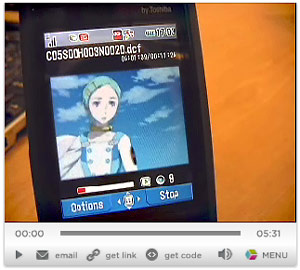Sharp Launches WX-T91 in Taiwan
Sharp and Fareastone have launched a version of Vodafone’s 903SH [.jpg] 3G phone in Taiwan. Designed to run on GSM/GPRS and W-CDMA 3G networks, the WX-T91 [.jpg] features the same 3.2-megapixel camera, Bluetooth, USB and infrared features, as well as a MiniSD card slot (supporting up to 1GB), an MP3/AAC music player and a bar-code scanner. It also supports Video/TV-Out enabling users to view their pictures and play games on their TV screens. The unit comes in three colors: black, red and white at an estimated retail price of almost $800 — approx. triple the street price in Japan.


 It’s rare for WWJ editors, a jaded bunch, to get too excited about new service announcements, but on 6 December, we jumped on this fresh Vodafone
It’s rare for WWJ editors, a jaded bunch, to get too excited about new service announcements, but on 6 December, we jumped on this fresh Vodafone